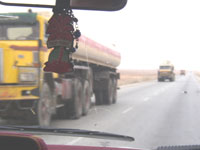|
Peace Team Details | Reports | Messages to
Shock and awe
First report from the Ottawa/Montreal contingent of
the Iraq Peace Team (Mary Foster, Mick Panesar and
Lisa Ndejuru)
 "One has to dismantle the wall of disinformation put
out by the US and the UK. ... I am appalled that Bush
thinks that informed persons will accept what he says
as evidence. ... There isn't one point in the state of
theunion address that can't be refuted by fact." --
Hans von Sponeck(paraphrase), CESR press conference,
Baghdad, 30 Jan 03.
"One has to dismantle the wall of disinformation put
out by the US and the UK. ... I am appalled that Bush
thinks that informed persons will accept what he says
as evidence. ... There isn't one point in the state of
theunion address that can't be refuted by fact." --
Hans von Sponeck(paraphrase), CESR press conference,
Baghdad, 30 Jan 03.
Baghdad, 30 Jan 2003. The sound of a wedding
intermingled with car horns and revving engines comes
in with the fresh breeze of a Baghdad winter evening.
Life in Baghdad continues its frenetic urban pace,
somehow undefeated by over a decade of low intensity
warfare and Bush's bullying threats in yesterday's
state of the union address.
Yesterday morning we left Amman to start the 12-hour
car ride to
Baghdad. Hour after hour, oil tankers streamed towards
us, bringing lifeblood to our economic system - and
stealing it from many in the gulf region. The oil we
saw on its way from Iraq is sold under the UN-managed
"oil for food" programme. The inadequacy of this
programme to meet the basic needs of the Iraqi people
is more visible than ever, according to a report
released by CESR in a press conference we attended in
Baghdad this morning
(www.cesr.org).
The oil for food programme was introduced in 1996 as
the "international community's" answer to the
devastating consequences of sanctions on Iraq. As we
drove south to Baghdad, the contrast between Jordan -
with its stark, empty landscape, Amman's relatively
humble buildings, the tent settlements by the
highways - and Iraq - with its excellent highways,
modern cities, experimental architecture of Baghdad -
spoke to the pre-war prosperity of the latter. A
prosperity which has been stretched to the snapping
point over the past decade: Iraq is a society whose
interdependent vital systems -electric, water, health,
food distribution - can bear no further pressure.The
assault planned by the Pentagon will provide that
extra pressure. According to the Pentagon – a good
source of information on such issues
– one of the first targets will be the electrical
grid, which will
debilitate the rest of the infrastructure. Water
treatment facilities, for
example, will cease to function, ensuring people have
no access to drinkable water.
Quite simply, the invasion will kill many of the
people we encounteredtoday: the children at the
hospital we visited, the man who sold us falafel, the
young boys in soldiers' uniforms trying to look like
men, the two men laughing and singing in the back of
the jeep we passed as we drove into Baghdad last
night, the translator I exchanged a few words with at
the press conference. Unlike Bush's allegations,
innuendos and downright lies, this claim, with its
implication of war crimes, is substantiated by hard
facts (provided, among other places, in the CESR
report).
It is hard, as a westerner, to look at people in the
eyes here. I found
myself unable to meet the gaze of two despairing
looking women waiting with their children outside the
hospital today. Traveling around Baghdad -refreshingly
free of MacDonalds and other multinationals - it hurt
to look at the many beautiful buildings and mosques
of Baghdad knowing that if the Pentagon's plans of
opening the attack with ‘shock and awe’ are
implemented, these proud and splendid structures will
soon be blackened rubble.
‘Shock and awe’ is pentagonspeak for a massive cruise
missile blitz. It is made all the more difficult
because of the friendliness of people we have met and
the gratitude of Iraqis who know of our anti-war work.
|